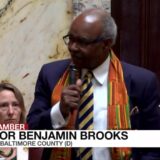Lawmakers on a California Assembly committee rejected a Senate-passed bill on Wednesday that sought to roll back existing employment protections for law enforcement workers who legally use marijuana while off the job, failing to advance the measure to the next step of the legislative process.
Members of the Assembly’s Labor and Employment Committee voted 3–2 in favor of approving the legislation, but others did not cast votes in either direction. Because the motion to refer the measure to its next committee received fewer than half the panel’s votes, it will not proceed to the Assembly Judiciary Committee at this point.
While the bill’s sponsor, Assemblymember Shannon Grove (R), requested the vote be reconsidered at a later date, the proposal is stalled for now.
The state Senate, for its part, passed the bill last month on a 31–3 vote.
SB 1264 was initially introduced in February as a minor, technical fix to the state’s current employment protection law, which prevents employers for discriminating against workers for pre-hire or off-the-clock marijuana use. In March, however, the proposal was significantly amended to roll back protections for a wide range of public service jobs, including not only police and sheriffs’ deputies but also positions in animal control, law enforcement communications and public administration.
A subsequent amendment later revised the list of exempted positions to include only five categories of sworn law enforcement employees: those involved in the apprehension, incarceration or correction of criminal offenders; those who handle civil enforcement matters; workers involved in evidence gathering and processing; and those providing coroner functions.
“Just to be frank, I don’t care if your grocery store worker is high,” Grove told the Assembly committee Wednesday. Her chief concern, she said, is that allowing police to use marijuana while away from work could expose local governments could legal liability.
“If there is an officer-involved shooting and that officer tests positive,” she said, “the liability for that lawsuit is going to fall on local government.”
“They should be held to a higher standard,” Grove said of sworn law enforcement, noting that police officers and sheriffs’ deputies carry firearms and are expected to make split-second, sometimes life-or-death decisions.
An amendment from the committee’s chair, Assemblymember Liz Ortega (D), would have further narrowed the bill by including a 2028 expiration date—a change that Ortega said earned her vote.
Grove said the amendment was proposed because the committee “wanted the sunset to see if it was effective or working,” adding that she’s “been working with opposition since day one” to craft a bill that could win broad support.
But other members of the panel said they still couldn’t support the legislation.
Assemblymember Chris Ward (D) said that he was “unconvinced” the measure was necessary, noting that employers, including law enforcement organizations, can already discipline workers for on-the-job impairment.
Likening off-duty marijuana use to drinking alcohol off the clock, Ward said he does “not want an officer showing up to work high or drunk, and I try to be very consistent with the rationale there.”
He agreed with Grove that law enforcement officers should be held to a higher standard than many other employees, but he disagreed on what that meant.
“Generally I think the higher standard is: Be a responsible adult,” he said. “Know that, if you do choose to use recreationally, that you’re doing so at a time and place which is safe and which does not put yourself or others into harm’s way.”
Assemblymember Rick Chavez Zbur (D) also said he had a problem with testing police for “legal activity that I don’t see as very different from alcohol use.”
“We are already are at a time when we’re having trouble recruiting people into law enforcement,” he argued, adding that a positive marijuana test “doesn’t really have much to do with…what your condition is on the job.”
The legislation had the support law enforcement groups, such as the California State Sheriffs’ Association and the California Police Chiefs Association, but was broadly opposed by labor unions.
Cory Salzillo, a lobbyist for the California State Sheriffs’ Association, said during a prior Senate hearing that the bill would provide needed clarity on whether law enforcement agencies can test applicants and workers for cannabis.
“We believed we were exempt under the language of that bill,” Salzillo said of the employment protection bill that took effect in January. “And since its passage and implementation and some more refined legal analysis, there is a little bit less clarity than we initially had. So we think this is a very targeted exemption.”
Opponents have included labor groups such as the United Food and Commercial Workers International Union (UFCW); the Service Employees International Union (SEIU); the California School Employees Association; the American Federation of State, County and Municipal Employees (AFSCME); and the California Employment Lawyers Association.
Drug policy reform advocacy groups such as the Drug Policy Alliance and California NORML also opposed the rollback bill at Wednesday’s hearing.
Kristin Heidelbach, a cannabis workforce development advisor and legislative advocate for UFCW, read a paragraph from the San Diego County Sheriff’s rules of conduct around alcohol, which states that “employees while off duty shall refrain from consuming intoxicating beverages to the extent that it results in unlawful impairment, such as driving under the influence or being unable to care for their own safety or the safety of others.”
She also repeated past warnings that while the bill in question applied only to law enforcement, it could encourage further rollbacks to the employment protection.
“Is it teachers after that? Is it doctors?” Heidelbach asked. “The better thing to do, really, would be loop cannabis into existing policies that are already in place and trust in our law enforcement. If they’re carrying a sidearm and we trust them to do that, we can trust them to be responsible with cannabis off the job.”
Meanwhile in California, lawmakers earlier this week revised a psilocybin pilot program bill to narrow eligibility criteria for participants and facilitators who could administer the psychedelic under the proposal. The legislation would allow the counties of San Francisco, Santa Cruz and San Diego to establish pilot programs where military veterans and former first responders could receive psilocybin treatment with a licensed facilitator.
Separately, a campaign to put psilocybin legalization on the state’s November ballot recently announced that it did not secure enough signature to qualify in time for a deadline.
Another campaign filed and then abruptly withdrew an initiative to create a $5 billion state agency tasked with funding and promoting psychedelics research last year.
A third campaign also entered the mix late last year, proposing to legalize the possession and cultivation of substances like psilocybin, LSD, MDMA, DMT, ibogaine and mescaline. People could buy them for therapeutic use with a doctor’s recommendation. Advocates for that measure still have time to gather and turn in signatures.
The California Legislative Analyst’s Office (LAO) has since released its review of that proposal, outlining not only the plan’s policy implications but also its potential fiscal impacts on the state—which the report calls “various” and “uncertain.”
Some California municipalities, meanwhile, are pushing forward with reform on the local level. The city of Eureka, for example, adopted a resolution in October to decriminalize psychedelic plants and fungi and make enforcement of laws against personal use, cultivation and possession a low priority for police. It’s at least the fifth local jurisdiction in the state to embrace the policy change. Others include San Francisco, Oakland, Santa Cruz and Arcata.





















